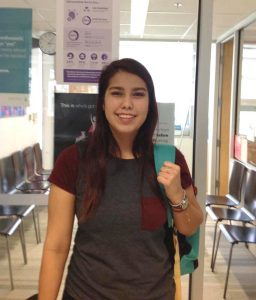Siera Stonechild is a 2nd year student in the Honours History major in the Bachelor of Arts. She is Plains Cree from Red Deer Alberta, and offers plenty of insight into the transition to, and life of, an Aboriginal student at UBC. Keep reading to learn more about her academics, her transition to the west coast, and for her advice on the best meal to power through stress!
What are you studying at UBC? What drew you to it?

I am majoring in Honours history in the Faculty of Arts. I enjoy this program because, although it is a bit more challenging, the support and sense of community is very important to me. As well, I enjoy the philosophical debates about historiography, and I’ve learned a lot about myself and how I view the world through choosing this program.
Could you tell me a bit more about your Honors History program?
The Honours History program is small group seminar-style, and is very similar to Master’s courses, so I’ve heard. Historiography is the study of History as a discipline, and, as history is eclectic, we look at many different authors like Ta Nehisi Coates, Foucault, Weber, and Kuhn. I feel like a better educated, better-rounded student and I have a new appreciation for my other courses. With my program, I get a sense of academia beyond the regular undergraduate experience, and I build close ties with my peers and professors. It is very difficult, but the benefits outweigh the extra reading. When I graduate, I will have a second language, and an undergraduate thesis to show for it.
What was it like transitioning to life at UBC as an Aboriginal student?
It was not too difficult for me; however, there were a few differences. I am Plains Cree, so I am not familiar with Indigenous west coast culture. It took a little bit of adjusting to the Longhouse on campus, as the practices and traditions are not the same as in my community back home. However, there is still the community around food, and humour, so I was happy that I came here! I have experienced some cultural insensitivity once in a course, but after speaking with the Aboriginal advisor about the issue it was quickly resolved in a way that gave me closure. All in all, going to university is going to be a transition, no matter your background. I recommend coming to UBC because of the ample support for Indigenous students from First Nations support services, the student body, the faculty, and everyone in between.
You’re from Red Deer, what was the move away from home like?
Coming from Red Deer, which I consider to be a city with a small-town mentality, I was a little nervous to be “just a small-town girl, living in a lonely world”. However, the campus and the surrounding endowment lands are at the edge of Vancouver and there are beaches, grocery stores, and anything else that I might need within walking distance. There is also the luxury of taking a bus for 30 minutes to get to city centre, if I want to do something “city-like”. The hardest thing to reconcile was going from being one of the smartest kids in the room, to average. I learned a lesson in humility, and I am a better student and person for it. I find that support for Indigenous peoples in Vancouver and UBC vastly differs from back home. There is more cultural awareness, less racism, and more structures built into the governance system that actively create better opportunities and understanding between the university and Indigenous students. UBC continues to consciously work towards a better relationship with Indigenous students, and I am more than happy and proud of my choice of post-secondary institution. As well, there is a larger Indigenous student body and community at UBC in comparison to Red Deer. The community is active with cultural events and is incredibly welcoming. I learned how to make mukluks last year, and I am excited to learn more this year!
Do you have any advice for new Aboriginal students at UBC?
I would say that realizing that if something is late, or you don’t do as well as you hoped, it will not be the end of the world. Yes, you may hand in an essay late, or fail a midterm, but there is always someone willing to help. Go to a professors office hours, or if you don’t like authority figures (like me), talk to a TA. TA’s are often more approachable than professors, and will most often mediate and advocate for you. As well, have a coping mechanism that you know works for you. When I am super stressed, have writer’s block, and am at my wits’ end, I order a large pizza. Food fuels my brain, I can have a power nap until it arrives, and pizza never fails to bring optimism with it. Also: Dominoes delivers to campus, and there is a student coupon you can use.
Where on campus is ‘home’ for you?
I literally live on campus, so home for me is the Vancouver campus! However, I like to socialize in Buchanan Tower near the History Lounge, or in the Longhouse on the couch. I prefer the Longhouse for relaxation because it feels more like I can be myself there. Plus, someone will always talk to you and show you where you can find food. For studying, I prefer IKB because I like the atmosphere and general murmur. I am not a big fan of Koerner Library, because the silence makes me worried about how loudly I turn pages. If I really need to crank out an essay, I go to any of the Buchanan buildings and set myself up in an empty classroom.
In the History Honours Program, students make the shift from being consumers of history to becoming producers of historical knowledge. For more information on the History Honours program, visit the program website.


